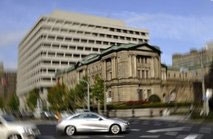BoJ lowers Japan growth forecast
 The BoJ cut its growth forecast for the year ending March 2012 to 0.4 per cent from an earlier 0.6 per cent due to the record earthquake and a tsunami that devastated the northeast coast and sparked a nuclear crisis.
The BoJ cut its growth forecast for the year ending March 2012 to 0.4 per cent from an earlier 0.6 per cent due to the record earthquake and a tsunami that devastated the northeast coast and sparked a nuclear crisis.
While the central bank upgraded its general view of the economy, saying it is "picking up" as post-quake supply-side constraints ease, it said growth prospects would be lower than earlier thought for the fiscal year ending March 2012.
It added that earlier projections for 2.9 per cent growth in the year starting April 1 2012 remain unchanged amid expectations Japan's economy will return to "a moderate recovery path from the second half of fiscal 2011."
The board also voted unanimously for the key interest rate to remain unchanged at between zero and 0.1 per cent.
In the aftermath of the earthquake, the BoJ injected a record amount of cash into the banking system and doubled an asset purchase fund to 10 trillion yen ($125 billion), a key policy tool it kept unchanged Tuesday.
The BoJ said domestic demand is picking up as household and business sentiment improves, while exports should also rise in the second half, striking a more upbeat tone compared to many private-sector analysts who see the economy shrinking this year.
But it warned that "uncertainty has increased somewhat with regard to the longer-term outlook for electricity supply constraints" with generating capacity lost after March 11, including the Fukushima Daiichi nuclear plant.
The twin disasters devastated entire towns along the northeast coast and left more than 20,000 dead or missing while wreaking havoc on industry, pushing the economy into recession in Japan's worst crisis since World War II.
The nation's biggest firms such as Sony and Toyota were forced to shutter plants and halt production due to shortages in electricity and parts caused by supply chain disruption, sending output and exports tumbling.
But Japan's recovery has been quicker than expected, as companies approach normal production levels ahead of earlier forecasts amid expectations that reconstruction spending will boost the economy in the second half.
The BoJ's Tankan survey of business sentiment earlier this month showed firms expect conditions to improve by September.
Recent data also suggest the worst of the post-quake impact may be over for the economy, say analysts. Industrial output posted the second-largest gain on record in May.
However, the government has warned this may have been partly driven by firms boosting production ahead of a decree for large users in the Tokyo and Tohoku regions to reduce consumption by 15 per cent for three months starting July.
The move comes as capacity has been lost after the disasters, including the Fukushima plant, which suffered reactor meltdowns and spewed radiation after cooling systems were crippled.
The board also maintained its core consumer price index projection for this fiscal year at a 0.7 per cent increase, a pace that will also continue for the following year.
What the stars mean:
★ Poor ★ ★ Promising ★★★ Good ★★★★ Very good ★★★★★ Exceptional
Latest News
More News
- Cashless payments hit 28 times GDP in 2025 (February 04, 2026 | 18:09)
- SSIAM and DBJ launch Japan Vietnam Capital Fund (February 04, 2026 | 15:57)
- Banks target stronger profits, credit growth in 2026 (February 04, 2026 | 15:43)
- Vietnam on path to investment-grade rating (February 03, 2026 | 13:07)
- Consumer finance sector posts sharp profit growth (February 03, 2026 | 13:05)
- Insurance market building the next chapter of protection (February 02, 2026 | 11:16)
- NAB Innovation Centre underscores Vietnam’s appeal for tech investment (January 30, 2026 | 11:16)
- Vietnam strengthens public debt management with World Bank and IMF (January 30, 2026 | 11:00)
- Corporate bond market poised for stronger growth cycle (January 28, 2026 | 17:13)
- Vietnam's IPO market on recovery trajectory (January 28, 2026 | 17:04)
















 Mobile Version
Mobile Version